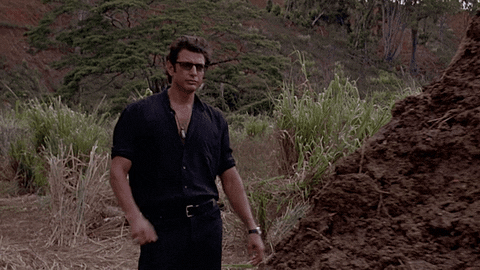Hello hello!
Welcome to Friendship Explained, where I, Anna Goldfarb, illuminate friendship mechanics through a pop culture lens. Today, we’re using the 1993 movie Jurassic Park as our source text.
Jurassic Park is a movie (“and book by Michael Crichton!” - sticklers in my comments) about the potential consequences of genetic manipulation and the disruption of the natural order.
Breaking news: man cannot control nature! Nature does whatever the heck it wants, like Kevin McCallister when his parents left him home alone.
But we’re not talking about Home Alone today. We’re talking about dinosaurs doing dino shit. And actual piles of dino shit.
The problem: You never hear from your friends. You wonder if your friends even care about you at all.
What Jurassic Park gets right: Jurassic Park shows the power of adaptation in service of survival, like the ability to reproduce despite being engineered as all-female populations. It also highlights the crucial nature of basic genetic needs, such as reproduction, sustenance, shelter, and adaptation. All animals have these needs. They’re born with them. T-rexes gonna t-rex, in other words.
For humans, our animal instincts also influence our behaviors, as we adapt and change to fit into our surroundings too.
What science says: According to Choice Theory by Dr. William Glasser, we all have five basic genetic needs:
Survival
Power
Love and belonging
Freedom
Fun
All behavior is an attempt to meet one (or more) of these needs.
We eat lunch (food = survival).
We have a job (money pays rent, etc. = survival) but we choose a career that increases our status (clout = power).
We have romantic and platonic relationships (relationships = love and belonging), wear our favorite band’s t-shirt (self-expression = freedom) and watch the “Love is Blind” reunion (watching this bullshit = fun, imho).
How to apply this to your friendships: If you want a friend to keep you close, consider helping them meet one or more of these basic needs. Look at your friend’s world and see how you can pitch in.
Here’s how I do it in my own close friendships
I. My sister who’s a parent: I stop by once a week and help watch her kids so she can take a nap.
Needs I’m helping with: Survival (letting her sleep), love and belonging (showing her I care).
Result: By helping with her immediate needs, she’s more willing to support me in parts of my life. I see her every week and we give each other little gifts to show our appreciation for one another.
II. My close friend who’s a workaholic: I bring my computer to her house and we co-work together. I go on business trips with her. I understand if she has to take a work call while we’re hanging out.
Needs I’m helping with: Power (we bounce ideas around about how to navigate her work life), love and belonging (offering her emotional support as she juggles life and work), and fun (we unwind from a hard day at work together).
Result: We feel like a true team. I enjoy celebrating her work wins and she jumps at any chance to help me with my work too. We get together as often as we can, often several times a week.
III. My close friend who is also a writer: We meet at a local cafe to work side-by-side.
Needs I’m helping with: Power (we share leads and opportunities), survival (recommending her for jobs = money), love and belonging (we share parts of our personal lives with one another), and fun (we exchange presents on holidays and birthdays).
Result: We’re a key part of each other’s success. I get to cheer on her victories and give understanding when work gets challenging. We’ve gotten together almost every week for years!
Our friendships are strong because I help them with things that are important to them –– their children, their careers, their social life. I don’t have to wonder if my friends value me. I KNOW they do.
Homework: Think about your 3 - 5 closest friends. Identify what their biggest needs are right now. Is it child care, making strides in their career, carving out time for their hobbies? Pipe up! Ask how you can help them achieve goals that are important to them.
And, this strategy helps with new friends too. Ask them: “How can I help you achieve your goals and dreams?” See what they say. Create a pocket of opportunity to deepen your bond.
If you help your friends meet their most pressing genetic needs, they will be more likely to keep you close. And you will feel good that you’re helping a cherished friend with something important to them because that touches on fulfilling your love and belonging need.

Let me know how it goes!
Your buddy,
Anna








Great advice, Anna.
A clever way to be a good friend and get some of your needs met as well. I love it!